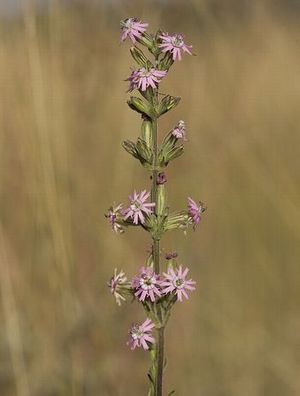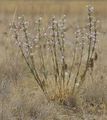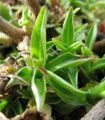Difference between revisions of "Silene scouleri"
(→Description) |
(→Description) (Tag: VisualEditor) |
||
| (18 intermediate revisions by 3 users not shown) | |||
| Line 1: | Line 1: | ||
| − | + | * Scientific Name: ''Silene scouleri'' subsp. scouleri | |
| − | * | + | * Family: Caryophyllaceae |
| − | * | + | * Common Names: Scouler's campion, Scouler's catchfly, wild pink, silene |
| − | * | + | * Codon: SILSCO |
| − | * | + | ---- |
| − | + | [[File:SISC.jpg|thumb|right|Photo by Rod Gilbert]] | |
| − | + | ||
| − | + | ||
| − | + | ||
| − | + | ||
| − | + | ||
| − | + | ||
| − | == | + | ===Taxonomy=== |
| − | + | {{Taxobox | |
| + | | name = | ||
| + | | regnum = [[Plant]]ae | ||
| + | | subregnum = Viridiplantae | ||
| + | | phylum = Tracheophyta | ||
| + | | subphylum= Spermatophytina | ||
| + | | classis = Magnoliopsida | ||
| + | | subclassis = Caryophyllanae | ||
| + | | ordo = Caryophyllales | ||
| + | | familia = Caryophyllaceae | ||
| + | | genus = ''Silene'' L. | ||
| + | | species = '''''Silene scouleri''''' Hook. | ||
| + | | subspecies = ''S. scouleri'' ssp. ''scouleri'' Hook. | ||
| + | }} | ||
| + | <ref>Integrated Taxonomic Information System. Retrieved from https://www.itis.gov/servlet/SingleRpt/SingleRpt?search_topic=TSN&search_value=20117#null</ref> | ||
| − | + | ===Description=== | |
| + | Perennial herb growing from a taproot and branched caudex<ref name=":1">Flora | ||
| + | of North America. Retrieved from http://dev.floranorthamerica.org/Silene_scouleri</ref> with many greenish-white to purplish flowers, up to 80 cm tall.<ref name=":0">WTU | ||
| + | Herbarium, Burke Museum, & University of Washington. Retrieved from http://biology.burke.washington.edu/herbarium/imagecollection.php?Genus=Silene&Species=scouleri</ref> Stems several,<ref name=":0" /> erect, puberulent.<ref name=":1" /> Basal leaves petiolate, oblanceolate, to 15 cm long;<ref name=":0" /> cauline leaves opposite, in 12 pairs, often sessile, lanceolate or similar.<ref name=":1" /> Inflorescences cymose,<ref name=":2" /> elongate and narrow;<ref name=":0" /> calyx tubular, 5-lobed, pubescent, pale with prominent darker venation;<ref name=":2" /> petals 5, clawed, limbs 2 to 4-lobed;<ref name=":0" /> stamens 10, epipetalous;<ref name=":2" /> styles 3, ovary stalked, becoming 1-celled capsule.<ref name=":0" /> | ||
| − | + | ===Bloom Period=== | |
| + | June - August | ||
| + | <ref name=":0" /> | ||
| − | + | ===Distribution=== | |
| + | ''S. scouleri'' subsp''. scouleri'' grows in west Cascades, B.C. to California, transitional to ''S. scouleri'' subsp. ''scouleri'' in the east Cascades in Washington and Oregon.<ref name=":2">Hitchcock, C. L., Cronquist, A., Giblin, D., & Legler, | ||
| + | B. et al. (2018). ''Flora of the Pacific Northwest: an illustrated manual''. | ||
| + | Seattle: University of Washington Press.</ref> | ||
| − | <ref | + | ===Habitat=== |
| + | Prairies and open forest, low to moderate elevations | ||
| + | <ref name=":0" /> | ||
| − | = | + | ===Uses=== |
| − | + | ||
| − | + | ||
| − | ==Uses= | + | |
| − | + | ||
| − | + | ||
| − | + | ||
| + | ==== First Nations ==== | ||
| + | Nɨwɨ medicine, a warm infusion of pounded plant used as an emetic for stomach pain.<ref>Native American Ethnobotany Database. Retrieved from <nowiki>http://naeb.brit.org/uses/search/?string=silene+scouleri</nowiki></ref> | ||
| − | [ | + | ===Propagation=== |
| + | Store seeds in refrigerator. Time to germination: 7 days. High percentage germination recorded. | ||
| + | <ref>Butler, Jennifer; Frieswyk, Christin. 2001. Propagation protocol for production of Silene scouleri seeds; USDI NPS - Rocky Mountain National Park, Estes Park, Colorado. In: Native Plant Network. URL: http://www.nativeplantnetwork.org (accessed 14 May 2012). Moscow (ID): University of Idaho, College of Natural Resources, Forest Research Nursery.</ref> | ||
| + | |||
| + | [https://npn.rngr.net/npn/propagation/protocols/caryophyllaceae-silene-959/?searchterm=Silene%20scouleri Native Plant Network Propagation Protocol] | ||
| + | |||
| + | ===Photo Gallery=== | ||
| + | <gallery> | ||
| + | File:Wtu027621 md.jpg|Rod Gilbert 2005 | ||
| + | File:SILSCO.jpg|Rod Gilbert 2006 | ||
| + | File:SILSCO1.jpg| Young plant, CNLM | ||
| + | </gallery> | ||
| + | |||
| + | ===References=== | ||
| + | <references /> | ||
Latest revision as of 16:58, 29 June 2021
- Scientific Name: Silene scouleri subsp. scouleri
- Family: Caryophyllaceae
- Common Names: Scouler's campion, Scouler's catchfly, wild pink, silene
- Codon: SILSCO
Contents
Taxonomy
| Scientific classification | |
|---|---|
| Kingdom: | Plantae |
| Subkingdom: | Viridiplantae |
| Phylum: | Tracheophyta |
| Subphylum: | Spermatophytina |
| Class: | Magnoliopsida |
| Subclass: | Caryophyllanae |
| Order: | Caryophyllales |
| Family: | Caryophyllaceae |
| Genus: | Silene L. |
| Species: | Silene scouleri Hook. |
| Subspecies: | S. scouleri ssp. scouleri Hook. |
Description
Perennial herb growing from a taproot and branched caudex[2] with many greenish-white to purplish flowers, up to 80 cm tall.[3] Stems several,[3] erect, puberulent.[2] Basal leaves petiolate, oblanceolate, to 15 cm long;[3] cauline leaves opposite, in 12 pairs, often sessile, lanceolate or similar.[2] Inflorescences cymose,[4] elongate and narrow;[3] calyx tubular, 5-lobed, pubescent, pale with prominent darker venation;[4] petals 5, clawed, limbs 2 to 4-lobed;[3] stamens 10, epipetalous;[4] styles 3, ovary stalked, becoming 1-celled capsule.[3]
Bloom Period
June - August [3]
Distribution
S. scouleri subsp. scouleri grows in west Cascades, B.C. to California, transitional to S. scouleri subsp. scouleri in the east Cascades in Washington and Oregon.[4]
Habitat
Prairies and open forest, low to moderate elevations [3]
Uses
First Nations
Nɨwɨ medicine, a warm infusion of pounded plant used as an emetic for stomach pain.[5]
Propagation
Store seeds in refrigerator. Time to germination: 7 days. High percentage germination recorded. [6]
Native Plant Network Propagation Protocol
Photo Gallery
References
- ↑ Integrated Taxonomic Information System. Retrieved from https://www.itis.gov/servlet/SingleRpt/SingleRpt?search_topic=TSN&search_value=20117#null
- ↑ 2.0 2.1 2.2 Flora of North America. Retrieved from http://dev.floranorthamerica.org/Silene_scouleri
- ↑ 3.0 3.1 3.2 3.3 3.4 3.5 3.6 3.7 WTU Herbarium, Burke Museum, & University of Washington. Retrieved from http://biology.burke.washington.edu/herbarium/imagecollection.php?Genus=Silene&Species=scouleri
- ↑ 4.0 4.1 4.2 4.3 Hitchcock, C. L., Cronquist, A., Giblin, D., & Legler, B. et al. (2018). Flora of the Pacific Northwest: an illustrated manual. Seattle: University of Washington Press.
- ↑ Native American Ethnobotany Database. Retrieved from http://naeb.brit.org/uses/search/?string=silene+scouleri
- ↑ Butler, Jennifer; Frieswyk, Christin. 2001. Propagation protocol for production of Silene scouleri seeds; USDI NPS - Rocky Mountain National Park, Estes Park, Colorado. In: Native Plant Network. URL: http://www.nativeplantnetwork.org (accessed 14 May 2012). Moscow (ID): University of Idaho, College of Natural Resources, Forest Research Nursery.




